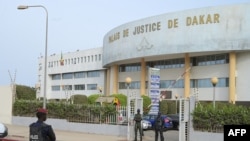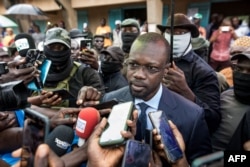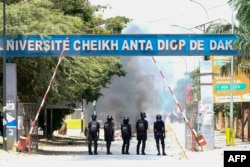A court in Senegal Thursday acquitted opposition leader Ousmane Sonko on charges of rape but sentenced him to two years in prison for corrupting youth, disqualifying him, for now, from participating in next year’s presidential elections.
The 48-year-old Sonko, the leader of the PASTEF-Patriots party, has maintained the charges were politically motivated since they first made in 2021 and did attend the court hearing Thursday. He had been accused of raping a massage parlor worker in 2021 and of making death threats against her.
Though a lesser charge than rape under Senegalese law, the conviction for "Corrupting youth," which is defined as immoral behavior or encouraging such behavior of a person under the age of 21 — his accuser was 20 when he was charged — disqualifies Sonko from running for office.
Sonko’s attorneys told reporters outside the court Thursday said the conviction was designed to prevent him from running against current President Macky Sall in 2024. It is unclear if Sonko can appeal the verdict.
Sonko has been an outspoken critic of the current president and is widely viewed as Sall’s most competitive opponent in the upcoming election.
Earlier this week Sonko, who is popular with Senegalese youth, called for mass protests in response to the case brought against him. Agence France-Presse reported Thursday demonstrations and fires set in the streets of the capital, Dakar.
The French news outlet also reports that security forces fired tear gas toward journalists staked out near Sonko’s residence. On its website, the news agency published video of a reporter and camera crew fleeing a cloud of gas.
The case against Sonko has raised tensions in the usually stable West African country. Last week, a “freedom caravan” led by Sonko from his hometown in southern Senegal to the capital led to clashes with security forces, and one person was killed.
On Wednesday, a day before Sonko’s sentencing, Sall launched a "national dialogue" he described as part of an effort to ease tensions, involving political forces, civil society, religious leaders and trade unions. The talks are scheduled to last about two weeks, with a large part of the opposition boycotting them.
Some information for this report was provided by the Associated Press, Reuters and Agence France-Presse.







